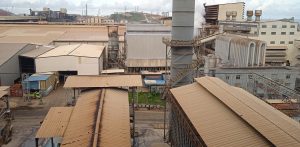Indonesia has the largest reserves of nickel ore in the world, located mainly on or near the island of Sulawesi. For a long time, the unprocessed ore has been mined in Indonesia and exported to other countries to be refined and used in the production of stainless steel. But over the last few years nickel has acquired new currency as a commodity and as a bargaining chip for Indonesia’s industrialization efforts.
Transitioning away from fossil fuels and toward clean energy will require batteries. Lots of them. Lithium-ion batteries, one of the most commonly used types, are manufactured using nickel as a key input. This means demand for nickel is expected to rise as clean energy transitions accelerate around the world.
As part of efforts to encourage downstream industrialization, several years ago Indonesia banned the export of unprocessed nickel ore. The purpose of this was to force companies to refine the ore in Indonesia and boost investment in domestic smelters. If we judge by that ambition alone it has been quite successful.
Since the export ban was enacted, billions of dollars have poured into Indonesian nickel smelters and associated industrial parks. We know it’s working because exports of refined nickel have exploded in recent years, to the point that there is now a global supply glut that’s putting some foreign nickel miners out of business.
Why did all of this happen? Exporting the unprocessed ore meant that most of the value added during the processing stage was not being captured in Indonesia. Processing nickel domestically means more of the value that is created remains in Indonesia. And in order to ensure Indonesian firms, and not just foreign firms operating in Indonesia, are involved in this value creation the state has been looking to expand its footprint in the sector.
Antam is an Indonesian mining company with interests in gold and nickel. It is 65 percent owned by the state through a holding company called MIND ID. This holding company was created to manage state-owned mining assets in a coordinated way so as to better serve the national and strategic interests of the state. Unsurprisingly, the nickel ore ban has been good for Antam’s business.
In 2018, before the ban was enacted, Antam’s revenue was around $1.6 billion (using a constant exchange rate of 16,000 rupiah to the dollar), 43 percent of which was export earnings. By 2023, revenue had grown to $2.6 billion, only 14 percent of which came from exports. Nickel ore has become an increasingly important part of Antam’s operations with the miner producing 13.5 million wet metric tonnes last year, up from 1.7 million in 2019.
Antam is producing a lot more nickel ore than it was just a few years ago, and almost all of it is being absorbed domestically. This indicates that the export ban is achieving one of its main aims. But the long-term goal was never limited to nickel ore, it was about moving into more valuable links on the nickel supply chain including smelting and associated industrial activities. We are seeing that process now start to play out.
While the export ban accelerated investment in nickel smelters, many of them are majority owned by foreign firms, particularly from China. It appears Antam is now eyeing a bigger role for itself in this part of the value chain, which provides useful context for Chief Executive Nicolas Kanter’s announcement last month that the state-owned miner would be acquiring a smelter from China’s Tsingshan Holding Group. Tsingshan has been a major investor in Indonesia’s downstream nickel sector. In a separate deal, Antam is partnering with Chinese firm Ningbo Contemporary Brunp Lygend to develop two additional nickel processing facilities.
Antam currently produces ferronickel, a type of alloy used to make stainless steel, but it has been held back by capacity constraints. Its ferronickel smelters have been operating at or near 100 percent capacity for the last several years, meaning its existing facilities cannot produce enough refined nickel to meet current demand.
These recent announcements signal that Antam wants to continue moving up and expanding its holdings in the nickel value chain by adding more processing capacity through co-development as well as acquisition. The likely end goal is not just to produce more ferronickel, but also to start producing more highly-refined battery-grade nickel.
Indonesia’s export ban uncorked a big investment boom in the domestic nickel value chain, with billions of dollars flowing into smelters and industrial parks. Now Antam is looking to insert itself into increasingly strategic and valuable links in that chain in order to exercise greater control over the production of refined nickel products like ferronickel and nickel matte. It’s still too early to say whether Indonesia’s nickel gambit will achieve all of its goals, but Antam acquiring and developing more smelter capacity is a key part of that long-term vision.

































